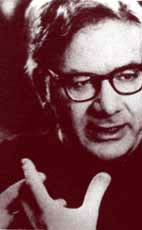| Dominick Argento: Minnesota Romantic
October 2002 Minnesota Romantic | Operas | Song Cycles | Choral Works | Orchestral | The Teacher/Composer | Timeline Dominick Argento's music
embraces and illuminates the human condition
My interest is people," says Dominick Argento. "I am committed to working with characters, feelings, and emotions." The joys and struggles of humanity form the heart of a body of work—operas, song cycles, choral music, and even orchestral works—that places him among the 20th century's preeminent vocal composers. His musical and scholarly peers have responded with some of their highest honors, including awards from Opera America and Chorus America, two Guggenheim Fellowships, election to the American Academy of Arts and Letters, and a Pulitzer Prize. Listeners, for their part, respond to the lyric beauty and emotional impact of music that stems from the Romantic tradition and affirms that works of art can help us know ourselves.
While Argento's fame has spread across the United States and Europe, its fountainhead is Minnesota. More than 60 Argento works have been premiered in the Twin Cities, and nearly every major musical organization in the state has commissioned work from him. Although Minnesota's best orchestras and choruses have long served as ambassadors for the arts around the globe, no single figure has done more to place Minnesota on the international musical map than Dominick Argento. Argento came to the Twin Cities in 1958 on three days' notice when a position at the University of Minnesota Music Department suddenly opened. An Easterner who had grown up in the historic town of York, Pennsylvania, he had already discovered as a Fulbright and Guggenheim scholar that Italy was his spiritual home. He had one opera behind him, The Boor (1957), the first of three provocative works based on Chekhov. At first, the Twin Cities disappointed the young professor and his wife, soprano Carolyn Bailey, but they soon realized that they had arrived on the threshold of a cultural explosion ignited by the opening of the Guthrie Theater.
Before long, Argento himself was immersed in the new theater, collaborating with Sir Tyrone Guthrie and Douglas Campbell in such memorable productions as The House of Atreus and The Shoemaker's Holiday, and adding to the cultural scene by cofounding the boldly contemporary Center Opera, which was destined to evolve into the Minnesota Opera. The Guthrie provided the stage for that company's 1964 debut with Argento's The Masque of Angels, a one-act opera, full of pageantry and dance, about a band of restless angels who occupy an empty church. The Masque showed Argento's inventiveness in breathing life into a moribund genre, and its rich choral dimension prophesied the emergence of a top-rank choral composer. "Early on," Argento recalls, "it started to dawn on me that living here I was able to do exactly what I lived for. After a few years, it never occurred to me that there was any other place I'd want to be except Minnesota. Here I've only had to be concerned with the performers and audiences I'm dealing with; living in a place like New York or San Francisco, a composer is always reading the market value of the arts—the ticker tape is coming into his workroom all the time. That is a distant phenomenon for me." Such a declaration of independence reveals the confidence of a creative artist who has resisted compositional fashions—atonality, chance and electronic music, minimalism, and the infiltration of the popular culture, especially rock. Ironically, though he will never be labeled a 12-tone composer, the serialism rampant when he came of age provides the logical underpinning in nearly everything he writes, although listeners don't realize it. The composer takes a sly pleasure in pointing out tone rows from which he has constructed soaring melodies and opulent harmonies. His compelling monodrama, A Water Bird Talk (1974), is based on two serial motives, one for the birds, another for the henpecked professor who realizes that his wretched marriage is reflected in their mating habits. Argento shrugs off the label "conservative" and is weary of comparisons with Benjamin Britten, in whom many critics find a similar lyricism, refined sense of language, and consummate craft. Argento's voice is his own. Had he not been a composer, he no doubt would have been a writer. In most cases, his best librettos are those he has written himself, A Water Bird Talk, Casanova's Homecoming (1985), and The Aspern Papers (1988). Or Argento might have been a critic, applying his analytical skills and sharp wit to a dumbed-down age. Mary Ann Feldman is the Minnesota Orchestra's program annotator, music adviser, and editor of Showcase. She is also a contributor to the New Grove Dictionary of Music and Musicians.
|
MPR Home | News | Music Collection | Events | Radio Listening | Your Voice | About Us | Support Us | Help ©2005 Minnesota Public Radio | Terms of Use | Privacy Policy |

